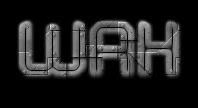I've been doing this whole I.T. thing for a while, but I just kind of fell into it. Back in the day, I was a different kind of geek. While "Theatre Degree" is not emblazoned across the top of my resume anywhere, I never actively conceal it in interviews or the workplace. If it comes up in conversation, it tends to make me stand out -- However, anyone with a degree in theatre who obsessively counts hits on their blog every day is not one to shy away from extra attention.
Look at me! Look! Look what I'm doing! It's cool! Look!
What I don't usually reveal in an interview is that I had only one computer class in college (History of Computing) which started with the abacus and moved up through Pascal and more "modern" things -- but I skipped the single lab day. I say usually, because if it comes up I totally disclose that and my three dance classes second semester senior year which I needed for PE credits just to graduate.
Here are some of the things I learned from "The Theatre" which apply in my current day-to-day corporate I.T. life:
1. If people buy a ticket to something, you can be sure they want to be entertained in some way. This gives the performer an edge, since the audience has already committed to suspending their disbelief for a while. This is partially why no one cares if they can see the wires holding Peter Pan in the air. This phenomenon is in the corporate workplace in a slightly different form. There is a basic, primal, tribal feeling of "mutual competence" in most workplaces. No human wants to believe, at the core of their being, that they are the only ones who know anything. In a rush to find like minds, co-workers will often suspend their disbelief and accept technical information at face value. It should be noted, however, that when this feeling gets broken (just like with a forgotten line or a falling set piece) it is a million times harder to get it back.
2. Audience participation is good -- To a point. The audience needs to be involved in the theatrical process. You need their buy-in just like you need the support of your users in an I.T. setting. However, just as anyone who wanders uninvited onto the stage in the middle of Act 2 should be Tazered and carried away, users who "help" too much should be Tazered and have their access revoked.
3. Hundreds of years ago, Playwrights were required to follow basic formulaic forms when creating new work. Anything else would get them branded as a heretic and burned at the stake. The rules are less strict today, but in I.T. you can expect almost the same level of backlash as a response to a new way of doing anything.
4. Communication is the point. Theatre is an art form about telling a story. If the audience leaves the theatre bewildered with no idea what they just dropped $40 on, you can bet they will scare their friends away from future performances. I communicate. One of the things that sets me apart from a lot of geeks is my ability to talk about technical things to non-technical people in a way that answers their questions and reduces their concerns. One time I had a performance review where I failed the "Communication" section. At this point in the meeting, I knew my manager was making stuff up to avoid giving me a raise. My reaction was an incredulous "Why don't you just put down that I steal office supplies and that you think I got the Receptionist pregnant -- because there is every bit as much truth in that?" As I thought, there was no defining incident where my communication skills had failed and, in the end, that section of the review was brushed off.
5. Don't try to fool the audience. All the pyrotechnics in the world won't distract them from bad acting. This translates to Corporate I.T. as "Power corrupts; PowerPoint corrupts absolutely". When giving a presentation, a hundred slides full of bullet points won't help at all. Make PowerPoint a backdrop to re-enforce a well-thought-out speech. If possible, use simple, non-focus-pulling images or single words.
6. Rehearsal is a time sink, but if you skip it everyone will know. Showing up unprepared for a presentation is obvious. You can't fake realistic confidence in anything you don't know and the Q&A will pick off anyone you managed to fool the first time through. Also, enunciate.
7. Costuming sets the mood and the context. If the lead actor is wearing a doublet and hose when he walks on stage, the audience will immediately know that this is a very different version of Oklahoma than they have ever seen before. I try to dress for work in a way that fits the contemporary mental image people have for "I.T. Professional". I do not use a pocket protector, because that is too heavy-handed. For most days, any button down and khakis will work. It should also be noted that I do not wear pants with pleats, partially because I think it is neat that they were banned during World War II and partially because they make me look like I have ginormous thighs. Whatever you wear, your work costume will give the people around you an immediate (even subconscious) idea of who you are.
8. A good actor can walk on stage, point towards the audience and mention the pouring rain and the audience will believe it while staying perfectly dry. In I.T., sometimes confidence and belief are more important than fact.
9. The audience respects a performance that is honest. An understated but authentic emotion will generally play better than screaming and flailing. When dealing with co-workers and users, I will try to always admit when I don't know something off the top of my head. An honest "I don't know but I'll try to find out" will always play better than "Your flux capacitor is loose".
10. The show must go on. Most often in the theatre the opening night is scheduled before the first rehearsal. From the publication of that date, whatever happens people will show up on opening night and expect to see something. This means there are often a large amount of all-night set construction parties, rehearsals that last until a few hours before the next rehearsal starts and much time spent with the rest of the cast and crew in shared misery and hard work towards a mutual goal. I.T. projects start off with a clearly published completion date. If the new login page isn't ready when the CIO tries to use it at 8am on that date, you can count on losing your grant money for future performances.
If you can't use any of this information right now, file it away. Someday, your child may want to major in Theatre.
-G
Also, if you want to reach people, theatre is not always the best way to do it.
Harvey Fierstein








No comments:
Post a Comment